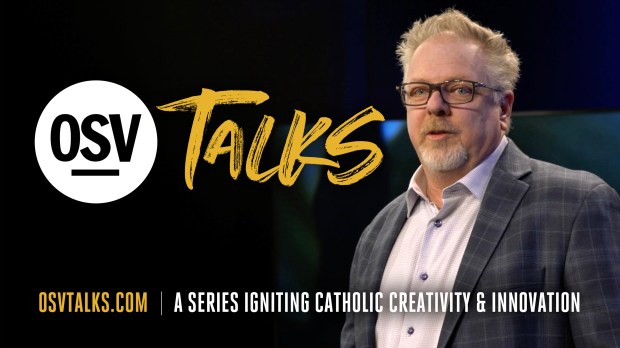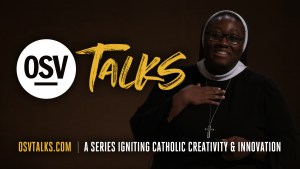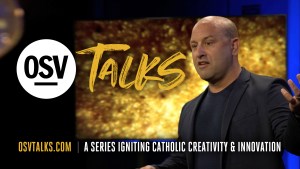An increase in generosity could solve the world’s most pressing issues, but the world is facing a “generosity crisis.” Because religion greatly affects charitable giving, churches and religious leaders have a central role in solving this situation.
That’s the critical message Nathan Chappell wants to share with the world. Chappell is on a mission to use artificial intelligence to help nonprofits improve their fundraising. Chappell’s research reveals that 56% of Americans made charitable gifts last year, giving 2% of their income on average.
Philanthropic giving alleviates poverty and inequity, improving and saving many people’s lives every day. So what would happen if we gave just a little bit more?
“Just a 1% increase from those that make gifts would equal $200 billion a year to address some of the world’s most pressing challenges,” Chappell said in his recent OSV Talk, AI and the Future of Generosity (available to watch on Vimeo and Facebook).
That slight increase of giving 1% more doesn’t seem like a big change. But increasing charitable giving is hard work.
“It turns out that giving 1% more of your money, or asking others to follow, is extremely challenging,” Chappell said.
Serious barriers to giving are on the record since ancient times. Thousands of years ago, Aristotle wrote,
“To give away money is an easy matter, and in any man’s power. But to decide to whom to give it, and how large and when, and for what purpose and how, is neither in every man’s power nor an easy matter. Hence, it is that such excellence is rare, praiseworthy and noble.”
Chappell and his team are working to solve these very issues—what he calls “Aristotle barriers.” He serves as Senior Vice President of DonorSearch Aristotle, leading the research and development division dedicated to leveraging artificial intelligence to help nonprofits harness actionable insights from big data.
“For the first time in history, there’s enough data and tools, meaning artificial intelligence tools, that can actually overcome these Aristotle barriers,” he said.
That seems like good news. But unfortunately, he’s uncovered some very concerning trends.
“There is some really discouraging news in the data that we found,” he said. “America is becoming less generous. The average American is actually giving less and less each year, and this is a really big shift in the last 10 to 15 years.”
What’s this got to do with Catholic innovation? “It’s not often that people correlate artificial intelligence and the Catholic Church,” Chappell said in an interview with Aleteia. But it turns out that religion and generosity are intimately connected.
It’s no coincidence that the drop in charitable giving is directly correlated to the rise of religious disassociation. The data indicates that religious participation encourages generosity. “Any person who associates with any religion gives twice as much as someone who does not,” he said.
As a result, the Church is central to America’s generosity crisis. “The path is clear that without acknowledgement of the generosity crisis, and deep innovation as it relates to the expression of gratitude through generosity, the United States will continue to become less and less generous each year,” Chappell said. “The implications of this will have a very negative impact on the Catholic Church, nonprofit organizations, and humanity in general.”
Due to its size and centralized nature, the Catholic Church has the ability to innovate at a greater scale than most other religions. That means that the Church can take the lead in solving the generosity crisis.
How can this be done? In his talk, Chappell shares what motivates charitable giving. Some of his findings are very unexpected, but they’re solidly research-based. For example, you might be surprised to know that financial capability and tax code changes have little effect on philanthropy.
He reveals what does affect philanthropy in his OSV Talk, and he offers specific approaches to help the world become more altruistic. If you’re interested in charitable giving or fundraising, it’s a talk you can’t miss.



